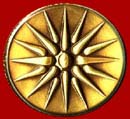| And a new double-natured
Confederative state is born unto us with the name of Serbia and
Montenegro. Yugoslavia disappears from the map after a history
of 85 years and subsequent to various adventures and every possible
regime. A formal confirmation of the new agreement is expected,
of course, from the Federal Parliament while the regional parliaments
of Serbia and Montenegro have already given their consent.
As Hellenes and neighbors of this new state we can
remark on the following that concern us directly and indirectly.
1) The predominance, the national factor, the ethnical
and political differences before various internationalist ideologies
are demonstrated by the dissolution of the multiethnic formation
of Yugoslavia as well as the abolition of its very name. Those
who deny the role of a nation and the supporters of a leveling
globalization should take note of this. Yugoslavianism began as
an ideology at the end of the 19th century, with the goal of a
union of Orthodox Serbs and Catholic Croates. The only thing that
bound them together was language. The reigning period of Yugoslavianism
was between 1918 and 1941 whereby Yugoslavianism was confronted
by serious problems from the Croatian nationality (the assassination
of King Alexander, etc.). Tito imposed communistic Yugoslavianism
by dictatorial means after 1944 by giving scandalous priviledges
to Albanians of Kosovo at the expense of Serbs. These internationalist
experiments didn’t succeed anything substantial. They oppressed
the peoples’ historic conscience, they fabricated artificial ‘nations’,
as the ‘Macedonians’ and the ‘Muslims’, and they led to the bloodshed
of the period from 1952 until today.
2) The new state was created with pressure coming
from the European Union and, personally, from Javier Solana, the
man responsible for the Common Foreign and Defense Policy. The
main goal was the distancing of the possibility of Montenegro
separating. Tzoukanovitz, the leader of Montenegro, consented
to postpone any discussion regarding the separation of Montenegro,
but the subject of remaining or separating will return in 3 years.
We see, that is, something similar to Bosnia-Herzogovina, where
the international community fabricated, in appearance a uniform
state with 2 separate existences: the serbian and muslim-croatian
existences. The divulgements speak of “2 in the packing of one”.
Is it possible that something like this is being also prepared
for Cyprus? The precedents of the two nations that we have reported
show that in the circles of the UN and of the specialists in solution
schemas, prevails the Confederative logic in the coping of regional
crises. This is what we must seriously have in our mind when we
study the various “Annan proposals” for Cyprus. These solutions
don’t prepare the ground for a unique State, but for 2 separate
states with a loose union between them. The Confederation of Serbia
and Montenegro leaves a great autonomy to the two regional governments
of Belgrade and Pondgoritsa, something that will appeal as a model
to Denktash.
3) It is proven that in our time it isn’t all that
difficult for a state to change its name. Mr. Solana on behalf
of the European Union proposed the striking out of the name Yugoslavia
and the adoption of the new naming. Therefore, it isn’t a hyperbole
nor an unrealistic Hellas demand that Skopje change their so called
“constitutional” name . It suffices to pressure and not abandon
the struggle. Let us not forget that the rebellious Albanian community
of Skopje (the arms have silenced temporarily, but murders occur
daily) wouldn’t have an objection to a change of the name, because
the word ‘Macedonia” represents only the Slavic community.
4) The separation movement of Montenegro may express
the economical and religious circles that move in the surrounding
of the President Tzoukanovitz, but it’s proven that it doesn’t
affect the majority of the Montenegro population. These people
know their history and remember that nationalistically they are
Serbian who followed a different path as a result of not submitting
completely to the Turks and they remained a quasi protectorate
of Russia. The Orthodox Metropolitan of Montenegro, who answers
to the Orthodox Patriarchate of Serbia, has preserved this historic
union of Montenegro with the Serbian trunk. Metropolitan Aphilochios
Rantovitz, a great adversary of the Milosevic regime up to its
fall, is a Doctorate graduate of the University of Athens and
a descendant of an old family of bishops of Montenegro. The Orthodox
Church in this case, as occurs with the Hellenism, safeguards
the national conscience. It isn’t chance that political circles
that desire the separation of Montenegro from the Serbian family
have tried to fabricate, without success, a new Autocephalous
Church of Montenegro.
5) Hellas must by all means support the livelihood
of the new state of Serbia–Montenegro. In the opposite situation,
the separation of Kosovo will be achieved. This is what the Albanian
freedom pursues and, generally, a new cycle of terror in the Balkan
neighborhood will begin. And let us not forget that UCK and its
branches have proclaimed: “After Kosovo and Skopje it’s Tsamouria’s
turn”; that is, Hellenic Epirus. |



